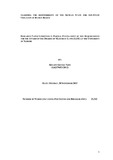| dc.contributor.author | Njue, Kellen, G | |
| dc.date.accessioned | 2016-04-20T07:35:06Z | |
| dc.date.available | 2016-04-20T07:35:06Z | |
| dc.date.issued | 2015 | |
| dc.identifier.uri | http://hdl.handle.net/11295/94334 | |
| dc.description.abstract | Development of Human rights law adopted a state-centred approach based on the powerful
nature of the state. The state was seen as the major violator of human rights due to the
substantial role that it played in provision of services to its populace. However, the
situation has changed whereby very powerful non-state actors with significant potential to
violate human rights have evolved. The human rights law seems to still over-rely on the
doctrine of state responsibility to realize human rights.
Though the applicable national and international legal framework recognizes that non-state
actors are required to respect human rights, the Kenyan policy and institutional framework
to ensure compliance focuses on the state and there is need for improvement.
Despite the duty of none state actors to respect human rights, the state has the primary
responsibility to ensure that people within its jurisdiction enjoy human rights. | en_US |
| dc.language.iso | en | en_US |
| dc.publisher | University of Nairobi | en_US |
| dc.subject | non-state violation of human rights | en_US |
| dc.title | Examining the responsibility of the Kenyan state for non-state violation of human rights | en_US |
| dc.type | Thesis | en_US |
| dc.description.department | a
Department of Psychiatry, University of Nairobi, ; bDepartment of Mental Health, School of Medicine,
Moi University, Eldoret, Kenya | |

